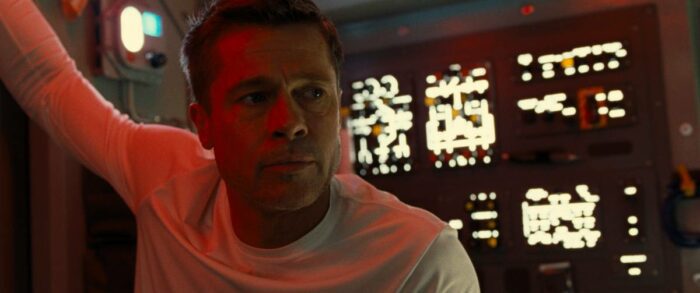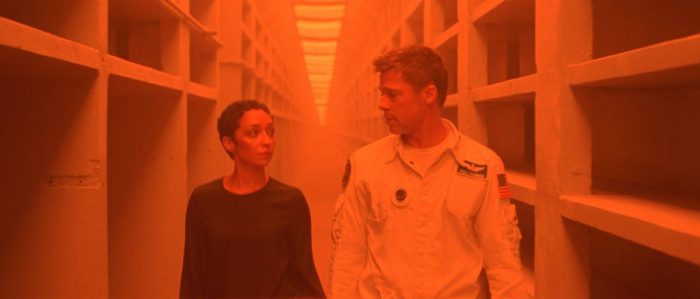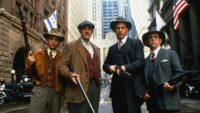There are competing dichotomies between performance and narrative in James Gray’s Ad Astra that are incredibly fascinating. The beginning of the film presents a focused pragmatic protagonist whose voiceovers are clear and stern about his impervious state of mind. That man is Brad Pitt’s veteran astronaut Roy McBride and he endeavors in a not-too-distant future that couldn’t be wider with ambition. Then, when the storyline strikes the catalyst that calls for preventing impending calamity, everything slowly shifts in competing directions.
The presented mission increases Roy distance from home and its securities. With each jaunting step into the solar system, the claustrophobic closeness of cinematographer Hoyte van Hoyema’s camera increases as well. What settings were once towering and broad become gradually more constricting and perilous. The same happens to the man. His compartmentalization skills begins to fail. The further Roy journeys, the narrations of the unfeeling and unrattled spaceman reveal hurt and pain that will not go away as easily as before. The global perils shrink to hinge on the simplistic fate of a father and his son.
That throbbing level of staggering aura occurring parallel to poignant familial intimacy in Ad Astra is remarkably captivating. This is an accomplishment of contemplative science fiction that is felt in your core as much as it pours wonderment in your eyes. The high concept space opera vibes and the melancholic musings have been stretched and exploited further in other cinematic offerings within this fictional discipline. Nevertheless, the sharpness of execution here is something to behold with plenty of profundity to absorb and impress.

Major Roy McBride is an unflappable ace in his services with the U.S. Space Command. Exactitude and mission discipline drive him at the expense of external joys and attachments, including his ever-disappointed wife Eve (Liv Tyler). When Earth begins to suffer crippling waves of electrical surges caused by antimatter bursts coming from Neptune, the only piece of machinery left orbiting that final gas giant planet of the solar system is the culprit. That space station probing for extraterrestrial life beyond is the farthest any human astronaut has reached. The man who reached that milestone was Roy’s father H. Clifford McBride (Oscar winner Tommy Lee Jones) and he hasn’t been heard from in nearly three decades.
If these bursts are the actions of Clifford, they must be stopped before the damage wipes out mankind. Cloaked in top secrecy and fearing that very worst, U.S. Space Command enlists Roy as a mouthpiece to communicate with his estranged pioneer father. The cover story is to learn about the threat when the real undertaking is to talk the man down. What looks like search and rescue could easily be flipped to seek and destroy. The only communication hub not damaged by these surges is a subterranean base on Mars run by the facility administrator Helen Lantos (Loving Oscar nominee Ruth Negga). By way of off-the-books rocket travel from the very commercialized Moon, Roy will be escorted by one of his father’s former teammates, Colonel Pruitt, played by Jones’ equally ancient Space Cowboys co-star Donald Sutherland.

Once urgency triggers impetus, those aforementioned dichotomies begin to engulf the viewing experience. The first knockout sensory trait is the electronica-tinged dirge of Max Richter’s musical score playing alongside a fantastic sound mix of active silence and science. It devours your cochleas. The superlative production values and canny special effects, both new heights of capability for James Gray following 2016’s The Lost City of Z, create a foreboding sense of suspense and an atmosphere fitting this hazardous pursuit orchestrated by Richter’s tenor. The colors and created surfaces created by Oscar-winning set decorator Karen O’Hara and production designer Kevin Thompson for this ascent into a Heart of Darkness for the heavens add to the intrigue mightily.
The truest ambience in this movie comes from heady and instinctual allegories emanating from the original story written by Gray expanding on the work of co-screenwriter Ethan Gross (TV’s Fringe). The director is no stranger to tales of exploration where the lofty external destination is dwarfed by a far more pressing internal one for the explorers. What waxes plenty poetically is still a tight and efficient 122 minutes with little waste. With either stronger measures of incongruity (think Kubrick) or a looser discipline of musing meditation (think Mallick), this could have turned out very obscure and far less compelling. The balance of quickening tingles and throat-clenching emotions is very well done.
Men have a distressing tendency where they bottle up and hide internal and external problems until they burst. The list of stresses that sink a man’s shoulders, heart, and spirit tends to be an eclectic one that should not cause the stigma of shame. It’s proof you’re human and need help. To highlight one specific, there is a taxing sense of unrealized resentment that pervades throughout many characters in Ad Astra, a crisis made to feel bigger than the potential extinction being faced. Born of untreated pain and anger, it is the heaviest weighted character chain. Relieving that is key.
To the general public, Clifford McBride is a legend with greatest attached to his name. He is the inspirational reason so many, including his own son, have entered the dream fulfillment of space exploration. But, to Roy, he’s the father that left him in his youth with a mountain of unanswered questions. The inquiry becomes whether Clifford’s hermetic quest was worth the broken bonds and repeated failures it caused.
All the sheen and shine of Ad Astra matter not without Brad Pitt’s committed lead performance. He’s been described often as a character actor inside of a body of a leading man. Pitt has always been a very economical actor where nuance plays right off of his charisma, where his mere presence can overwhelm. He merges both here perfectly for Gray’s ponderous material. Through each gruff dismissal and frozen pause of internal conflict, Brad Pitt makes immersion look so natural and easy. The character’s unraveling never buckles the actor’s command underneath. The soon-to-be 56-year-old star of Once Upon a Time… In Hollywood just doubled his Oscar chances for next February.
There’s a line in this film that ripples with multiple meanings. It’s the assertion of “we’re all we’ve got.” You can take that chestnut to mean several things, from the limits and scarcity of family to our entire civilization’s interdependence with this one precious planet we occupy. Piggybacking from Lesson #1 of what wears on men, that line becomes more of an omen than a rallying call. The tip-of-the-spear dreamers in Ad Astra need to be mindful of the necessary “we” for managing needs and challenges. The expansion of knowledge, glory, or fortunes without prepared conditioning or thought of consequence for the greater good does not work without some level of togetherness.
Ad Astra | Official Trailer 2 [HD] | 20th Century FOX
On Digital December 3 http://bit.ly/AdAstra_DigitalOn Blu-ray December 17 http://bit.ly/OwnAdAstraA paranoid thriller in space that follows Roy McBride (Brad…



